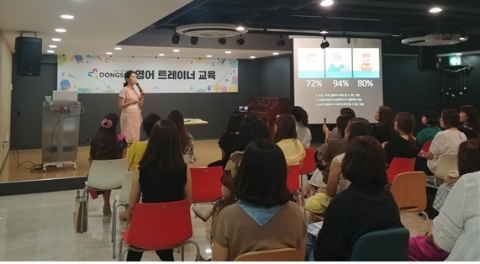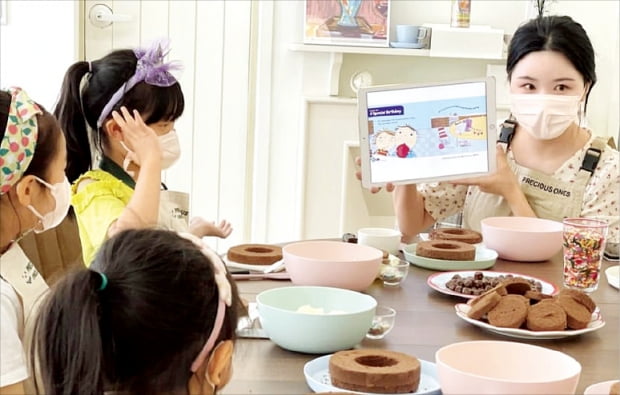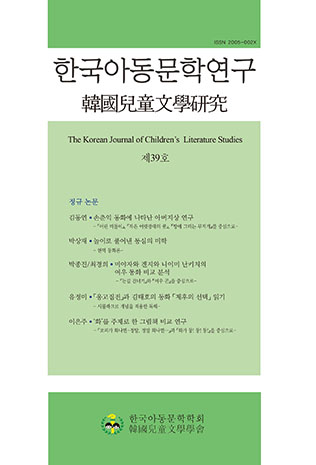동심 영어 로
동심 영어 로란 어린이들에게 영어를 유창하게 구사할 수 있도록 도와주는 교육 방법을 말한다. 이는 영어를 두 번째 언어로 습득하는 것이 아닌, 영어로 자연스럽게 생활하며 익숙해지는 것을 중점으로 한다. 동심 영어 로는 어린이들이 어떠한 언어 경험도 없는 동안에도 직관적이고 자연스러운 방법으로 영어를 학습하게 해준다.
동심 영어 로의 주요 특징과 목표 (Key features and objectives of childhood English immersion)
동심 영어 로의 주요 특징은 아래와 같다:
1. 자연스러운 언어습득: 동심 영어 로는 어린이들에게 영어를 억지로 가르치지 않는다. 대신, 어린이들이 영어를 자연스럽게 쓰고 듣는 환경을 제공하여, 일상 속에서 언어를 익히게 한다.
2. 다양한 활동과 게임: 동심 영어 로는 다양한 활동과 게임을 통해 어린이들이 즐거운 경험을 하면서도 영어를 학습하게 도와준다. 이는 어린이들이 영어에 대한 부담 없이 즐겁게 학습할 수 있는 환경을 조성한다.
3. 전문 교사와 교육 프로그램: 동심 영어 로 프로그램은 전문 교사들이 개발한 교육 프로그램을 기반으로 한다. 이를 통해 어린이들은 고품질의 교육을 받을 수 있다.
동심 영어 로의 목표는 아래와 같다:
1. 언어 구사 능력: 동심 영어 로를 통해 어린이들은 풍부한 어휘력과 문법 지식을 습득할 뿐만 아니라, 현지에서 자연스럽게 소통할 수 있는 영어 실력을 키울 수 있다.
2. 문화적 이해: 동심 영어 로를 통해 어린이들은 다양한 문화와 사회적 관습들에 대한 이해도를 높일 수 있다. 이는 미래에 국제 사회에서 더 나은 협력과 이해를 통해 성공적인 성장을 이룰 수 있게 도와준다.
3. 자신감과 창의성: 동심 영어 로는 언어 능력 뿐만 아니라, 소통과 창의성을 발휘할 수 있는 환경을 제공한다. 이는 어린이들이 자신감을 갖고 그들의 능력을 최대한 발휘할 수 있게 돕는다.
동심 영어 로 프로그램의 구성과 교육 방법 (Structure and teaching methods of childhood English immersion programs)
동심 영어 로 프로그램은 일반적으로 다음과 같은 구성으로 이루어져 있다:
1. 반복과 흥미로운 활동: 어린이들은 반복적인 활동과 흥미로운 게임, 노래, 이야기 등을 통해 영어 실력을 향상시킬 수 있다. 이는 어린이들에게 영어를 쉽고 재미있게 학습할 수 있는 방법을 제공한다.
2. 자율 학습: 동심 영어 로에서는 어린이들을 자율적인 학습에 도전하도록 유도한다. 어린이들은 스스로 학습 목표를 설정하고, 문제를 해결하는 과정에서 영어를 적극적으로 사용한다.
3. 현장 학습: 동심 영어 로에서는 현장 학습을 통해 어린이들이 영어를 실제로 사용할 수 있는 경험을 제공한다. 예를 들어, 영어 캠프나 해외 체험 프로그램을 통해 다양한 상황에서 영어를 사용하도록 돕는다.
동심 영어 로의 효과적인 학습을 위한 전략 및 활동 (Strategies and activities for effective learning in childhood English immersion)
동심 영어 로에서 효과적인 학습을 위해 사용되는 전략과 활동은 다양하다. 아래는 일반적으로 사용되는 몇 가지 예시이다:
1. 체험적 학습: 어린이들은 실제로 영어를 사용하면서 새로운 경험을 할 수 있는 환경을 제공받는다. 이는 어린이들이 영어를 실생활에서 적용하고 이해하는 데 도움을 준다.
2. 예술과 창작 활동: 동심 영어 로에서는 어린이들이 예술과 창작을 통해 자신의 생각과 감정을 표현하도록 유도한다. 이는 언어 능력을 향상시키는 데 도움을 줄 뿐만 아니라, 창의성과 자아 표현력을 개발하는 데에도 도움을 준다.
3. 역할 놀이: 어린이들은 역할 놀이를 통해 다양한 상황에서 영어를 사용하고 소통하는 경험을 할 수 있다. 이는 어린이들이 영어를 직관적이고 자연스럽게 습득할 수 있도록 돕는다.
동심 영어 로의 장단점과 비교 분석 (Advantages and disadvantages of childhood English immersion compared to other methods)
동심 영어 로는 다른 영어 학습 방법과 비교했을 때 여러 장점을 가지고 있다:
1. 자연스러운 언어 습득: 동심 영어 로는 일상 생활에서 어린이들이 영어를 사용하도록 한다. 이는 어린이들이 영어에 노출될 시간을 늘리고, 자연스럽게 영어를 습득할 수 있게 한다.
2. 조기 학습의 이점: 어린이들은 언어 습득 능력이 높은 시기에 동심 영어 로를 통해 영어를 자연스럽게 익히게 된다. 이는 어린이들이 미래에 영어에 대한 자신감과 능력을 갖출 수 있게 해준다.
하지만 동심 영어 로는 아래와 같은 단점을 가지고 있다:
1. 다중 언어 습득의 어려움: 동심 영어 로를 사용하는 어린이들은 한국어와 동시에 영어를 습득하기 때문에 언어 습득에 대한 부담이 있을 수 있다.
2. 학습 효과의 다양성: 각 어린이는 동심 영어 로에 대해 다르게 반응할 수 있다. 어떤 어린이들은 높은 수준의 언어 능력을 개발할 수 있지만, 다른 어린이들은 어려움을 겪을 수도 있다.
동심 영어 로에서 부모의 역할과 참여 (Parental role and involvement in childhood English immersion)
동심 영어 로에서 부모의 역할은 큰 의미가 있다. 부모들은 아래와 같은 방법으로 활동적으로 참여할 수 있다:
1. 언어 모델: 부모들은 어린이들에게 좋은 언어 모델이 되어 영어를 적절하고 정확하게 사용한다. 자연스럽고 명확한 영어 표현을 통해 어린이들이 영어를 습득하는 데 도움을 줄 수 있다.
2. 지원 및 동기 부여: 부모들은 어린이들의 동심 영어 로 학습을 지원하고 동기를 부여할 수 있다. 학교와의 소통을 통해 학습 진도나 어려움에 대한 정보를 공유하며 도움을 요청할 수 있다.
3. 일상의 영어 사용: 부모들은 가정에서도 영어를 사용하여 어린이들이 영어에 노출되는 시간을 늘릴 수 있다. 예를 들어, 영어로 책을 읽거나 대화를 나누는 것이다.
FAQs:
1. 동심으로 돌아가다 영어로 뜻이 무엇인가요?
“동심으로 돌아가다”는 “returning to one’s childlike innocence”라는 뜻이다. 이는 어린 시절의 순수하고 순박한 마음으로 돌아가는 것을 의미한다.
2. 동심파괴 영어로 뜻이 무엇인가요?
“동심파괴”는 “destroying one’s childlike innocence”라는 뜻이다. 이는 어린 시절의 순수한 마음을 잃어버리는 것을 의미한다.
3. Childlike innocence의 동심 영어 로 뜻은 무엇인가요?
Childlike innocence란 어린이들의 순수하고 순박한 마음이나 행동을 의미한다. 동심 영어 로에서는 이러한 childlike innocence을 유지하고 언어 학습에 적극적으로 참여하는 것을 지향한다.
4. 동심 영어 로 프로그램은 어느 정도까지 효과가 있을까요?
동심 영어 로 프로그램의 효과는 개인에 따라 다를 수 있다. 그러나 일반적으로 동심 영어 로 프로그램은 어린 시기에 영어를 노출시키고 학습하는 것이 언어 습득에 도움이 된다는 연구 결과가 많이 있다. 효과는 완전히 영어 능력과 학습 태도에 따라 다르지만, 동심 영어 로를 통해 영어 실력과 자신감을 향상시키는 데 도움이 될 것이다.
사용자가 검색한 키워드: 동심 영어 로 동심으로 돌아가다 영어로, 동심파괴 영어로, 동심 뜻, Childlike innocence
Categories: Top 97 동심 영어 로
[동심연구소키즈Tv] 잉글리시두_What Color Do You Like [Step 2-9]
여기에서 자세히 보기: taomalumdongtien.net
동심으로 돌아가다 영어로
Have you ever longed for the carefree days of childhood, where worries were nonexistent and joy was abundant? The desire to go back in time and experience the innocence and wonder of our younger years is a sentiment shared by many. In Korean, this nostalgic yearning is beautifully encapsulated in the phrase “동심으로 돌아가다”, which translates to “going back to childhood” in English.
What does 동심으로 돌아가다 mean?
Literally translating to “returning to the original heart,” 동심으로 돌아가다 is an expression that evokes a sense of revisiting one’s core innocence and childlike wonder. It represents an emotional journey, a way of reconnecting with the carefree spirit and untainted happiness experienced during childhood.
For Koreans, 동심으로 돌아가다 holds a special place in their hearts, as it symbolizes a return to simpler times. It signifies a desire to escape the burdens and complexities of adult life, even if just for a moment, and relive the precious memories of childhood.
The significance of 동심으로 돌아가다 in Korean culture
In Korean culture, there is a deep appreciation for the value of preserving one’s inner child. The idea of 동심으로 돌아가다 aligns with the belief that maintaining a childlike perspective can bring joy, happiness, and creativity to one’s life.
In various aspects of Korean society, this concept is celebrated. It is visible in the vibrant and colorful festivals that bring communities together, the rich folklore and fairy tales passed down through generations, and even in K-pop, where performers often exude youthful energy and enthusiasm.
How to embody 동심으로 돌아가다 in your everyday life
Incorporating the essence of 동심으로 돌아가다 in your daily routine can be a wonderful way to reconnect with the carefree and joyful spirit of childhood. Here are some tips to get you started:
1. Embrace playfulness: Engage in activities that allow your inner child to flourish. Whether it’s playing a sport, indulging in arts and crafts, or simply goofing around with friends, embracing playfulness helps to cultivate a sense of joy and spontaneity.
2. Explore nature: Step outside and immerse yourself in the beauty of the natural world. Go for a walk in the park, hike in the mountains, or have a picnic by the beach. Revel in the simple wonders of the environment around you and let it inspire a sense of awe and wonder, just as it did when you were a child.
3. Revisit childhood hobbies: Rediscover the activities that brought you joy as a child. Whether it was painting, writing, dancing, or playing a musical instrument, give yourself permission to indulge in these hobbies once again. They can be an excellent outlet for self-expression and can reignite a childlike passion within you.
4. Spend time with children: Interacting with children can be a powerful way to tap into the innocence and pure delight of childhood. Not only do they remind us to see the world through fresh eyes, but their unbounded enthusiasm and limitless imagination can inspire us to embrace our own inner child.
FAQs about 동심으로 돌아가다
1. Is 동심으로 돌아가다 exclusive to Korean culture?
While 동심으로 돌아가다 is a phrase deeply rooted in Korean culture, the longing to go back to childhood is a sentiment that transcends cultural boundaries. People from all over the world can relate to the desire for a simpler and carefree existence, reminiscent of their youthful days.
2. Can I truly go back to my childhood?
Physically returning to our childhood is impossible, but embodying 동심으로 돌아가다 means embracing the innocence, wonder, and joy that we experienced during that time. It is about reconnecting with our inner child and allowing ourselves to view the world with a sense of awe and excitement.
3. Why is it important to reconnect with our childhood selves?
Reconnecting with our childhood selves allows us to tap into our innate creativity, imagination, and curiosity. It reminds us to find joy in the small things and not take life too seriously. Embracing our inner child can bring a lightheartedness and playfulness to our lives, enhancing overall happiness and well-being.
In conclusion, 동심으로 돌아가다 is a beautiful expression that encapsulates the universal longing to rediscover the innocence and joy of childhood. It encourages us to embrace playfulness, explore nature, reconnect with childhood hobbies, and spend time with children to reconnect with our inner child. While we cannot physically turn back time, we can embark on an emotional journey that allows us to experience the carefree spirit and wonder of childhood once more. So why not let 동심으로 돌아가다 guide you in finding happiness and delight in the present moment?
동심파괴 영어로
Dongshimphawo can occur in various aspects of life, such as education, careers, relationships, or personal goals. It is not limited to a specific age group or social status, as anyone can experience the devastation of shattered dreams. This phenomenon is often encountered by individuals who have invested significant time, effort, and emotional energy into pursuing their dreams, only to face setbacks or failure.
One common example of 동심파괴 is the experience of students who tirelessly work towards entering prestigious universities. They may devote countless hours studying, sacrificing other activities and personal relationships, with the hope of achieving their dreams. However, when they receive rejection letters from their desired institutions, the resulting disillusionment can be emotionally devastating. Similar scenarios can arise in various domains, such as failed business ventures, unfulfilling careers, or even the breakdown of long-term relationships.
The causes of 동심파괴 can be intricate and multifaceted. Unrealistic expectations placed upon oneself or external pressures can contribute to the feeling of deep disappointment and despair. The societal emphasis on achievement and success can create an environment where individuals feel an intense pressure to meet certain standards. Personal or societal judgements can also play a significant role in exacerbating the experience of 동심파괴.
Coping with 동심파괴 can be a challenging process, but it is crucial for one’s well-being. Here are some strategies that can be helpful:
1. Acceptance and self-compassion: Acknowledge and accept the disappointment you feel. Understand that setbacks and failure are a natural part of life. Be kind to yourself and treat yourself with compassion rather than self-blame.
2. Reevaluate and redefine goals: Take some time to assess whether your previous goals were truly what you desired or if they were influenced by external factors. Learning from the experience can help you redefine your dreams and set new, more realistic and authentic goals.
3. Seek support: Reach out to friends, family, or professionals who can provide emotional support and guidance. Sharing your feelings with others can help alleviate the sense of isolation and helplessness.
4. Practice self-care: Engage in activities that bring you joy and allow yourself to heal. Take care of your physical and emotional well-being by exercising, spending time in nature, practicing mindfulness, or pursuing hobbies.
5. Cultivate resilience: Realize that setbacks are opportunities for growth. Learn from your failures and use them as stepping stones towards future success. Cultivating resilience can help you bounce back stronger from the experience of 동심파괴.
FAQs:
Q: Can 동심파괴 have long-lasting effects?
A: Yes, the impact of 동심파괴 can be long-lasting. It can affect self-esteem, self-worth, and overall mental well-being. However, with time and proper coping strategies, individuals can recover from this experience.
Q: Is 동심파괴 a common phenomenon?
A: 동심파괴 can be a common experience, as many people have faced disappointments or failures at some point in their lives. However, its intensity and prevalence may vary from person to person.
Q: How can I help someone who is experiencing 동심파괴?
A: It is important to be supportive and empathetic towards the person. Listen attentively, provide a safe space for them to express their emotions, and avoid judgment. Encourage them to seek professional help if needed.
Q: Are there cultural differences in the experience of 동심파괴?
A: While 동심파괴 is a concept rooted in Korean culture, similar experiences can be found in different cultures worldwide. However, the societal and cultural context in which 동심파괴 occurs may influence its specific manifestations and the emphasis placed on certain aspects of life.
동심 뜻
“동심”은 한국어로 “나의 옛날 아이의 마음”이라는 뜻입니다. 이 용어는 어릴 적 느낀 순수하고 순진한 감정을 뜻하며, 어른이 되어서도 여전히 그 마음을 가지고 있다는 의미를 내포하고 있습니다. 동심의 뜻은 한국 문화와 전통에서 중요한 개념으로 여겨집니다. 이 글에서는 동심의 의미와 그 중요성에 대해 자세히 알아보고, 동심에 대한 자주 묻는 질문들을 답변하겠습니다.
동심은 고대 한국 철학인 동양철학에서 주요한 개념입니다. 한국인은 어렸을 때 몰랐던 세계의 복잡성과 문제들로부터 멀어져 자신을 안아주는 어린아이처럼 평온하고 편안한 마음을 가질 것을 권장합니다. 이는 동양의 대부분 문화에서 공유되는 개념이기도 합니다. 동심의 개념은 주로 자기 재생적인 성장과 함께 현실 세계의 요구를 충족시키기 위해 환경을 바꾸는 것에 대한 관심을 불러일으킵니다.
한국인들은 자주 집중력을 유지하거나 감정을 통제하는 데 어려움을 겪을 때 동심을 찾습니다. 동심은 유능한 상담사 및 전문가들을 통해 복구될 수 있습니다. 예컨대, 명상, 미술, 음악, 체육활동 등 다양한 방법을 통해 동심을 회복시키는 훈련을 할 수 있습니다. 이는 개개인마다 다를 수 있기 때문에 동심의 찾음은 개인별로 다른 접근법이 필요할 수 있습니다. 동심을 찾는 것은 마음의 평화를 재건하고 개인의 잠재력을 발휘할 수 있도록 돕습니다.
동심은 또한 창의성과 상상력을 촉진하는 데 중요한 역할을 합니다. 어렸을 때, 우리는 제약 없는 상상력을 가지고 있습니다. 하지만 성장함과 함께 문제에 대한 걱정과 현실성에 얽매이는 경향이 생기게 됩니다. 동심은 우리에게 자유로운 상상력과 새로운 아이디어를 가져다줌으로써 문제를 해결하고 창의적인 방식으로 접근할 수 있도록 돕습니다.
동심은 또한 현실적인 대안을 창출하는 데 도움을 줍니다. 우리가 성장하면서 얻게 되는 현실적인 삶, 여러가지의 책임과 제약으로 인해 동심의 마음을 잃고 헤메기 마련입니다. 하지만 동심을 되살리면 우리는 새로운 관점과 옵션을 발견할 수 있으며, 기존에 보이지 않았던 문제 해결 방법을 찾을 수 있습니다. 동심은 우리가 삶의 변화와 도전에 직면했을 때 활력과 역량을 되찾을 수 있는 도구가 될 수 있습니다.
자주 묻는 질문들 (FAQs)
Q1: 동심을 잃은 것 같아요. 어떻게 동심을 찾을 수 있을까요?
A1: 동심은 어려운 문제의 해결에 도움이 되는 중요한 요소입니다. 동심을 찾기 위해 명상, 예술 또는 운동과 같은 마음을 치유하는 활동을 시도해보세요. 또한 상담사나 전문가의 도움 또한 많은 도움이 될 수 있습니다.
Q2: 동심을 지키는 방법은 무엇인가요?
A2: 생활 속에서 동심을 유지하기 위해서는 자주 쉬는 시간을 가지고, 스트레스를 관리하고, 자기 관리에 중점을 두는 것이 중요합니다. 또한 취미 또는 관심사를 통해 자신을 위한 시간을 가져보세요.
Q3: 동심을 가지고 있는 상태에서 어른이 되는 것은 가능한가요?
A3: 네, 동심을 가지고 있는 상태에서 어른이 되는 것은 가능합니다. 동심은 우리의 내면의 아이와 연결된 상태입니다. 이는 우리가 성장함에 따라 책임을 질 수 있으면서도 정신적인 활력을 유지할 수 있는 방법입니다.
Q4: 동심을 잃었다면 어떻게 되찾을 수 있나요?
A4: 동심을 잃었다고 느낀다면, 동심을 찾기 위한 사색의 시간을 갖는 것이 좋습니다. 일상에서 자연이나 예술과 접촉하는 것도 좋은 방법입니다. 또한 동심에 대해 이야기하고 공유하는 것도 도움이 될 수 있습니다.
동심은 우리의 내면에서 힘을 얻는데 중요한 개념입니다. 동심은 우리가 어렸을 때 가지고 있던 순수하고 순진한 마음을 유지하면서도 성장하고 현실적인 삶을 살아가는 데 도움이 됩니다. 동심을 가진 채 어른이 되면 우리는 새로운 관점과 창의적인 아이디어를 발휘하여 성공적인 삶을 살아갈 수 있습니다. 동심을 잃었다고 느낀다면, 동심을 찾기 위한 여러 가지 방법을 시도해보세요.
주제와 관련된 이미지 동심 영어 로
![[동심연구소키즈TV] 잉글리시두_What Color Do You Like [STEP 2-9] [동심연구소키즈TV] 잉글리시두_What Color Do You Like [STEP 2-9]](https://taomalumdongtien.net/wp-content/uploads/2023/06/hqdefault-1824.jpg)
동심 영어 로 주제와 관련된 이미지 15개를 찾았습니다.









![서부동심] 김포.고양 영유아교육기관 (동심) 영어강사 모집합니다. - 사람인 서부동심] 김포.고양 영유아교육기관 (동심) 영어강사 모집합니다. - 사람인](https://pds.saramin.co.kr/company/logo/202209/22/ril626_mm5s-1ph0946_logo.jpg)






![IT써보니] LG유플러스, 'U+초등나라'로 또 한번 '동심공략' - 뉴스핌 It써보니] Lg유플러스, 'U+초등나라'로 또 한번 '동심공략' - 뉴스핌](https://i.ytimg.com/vi/CRWWl5ixkKk/maxresdefault.jpg)
![시흥광명동심(KIDSTREE)] 동심 시흥광명지사 21년 영어강사모집합니다. - 사람인 시흥광명동심(Kidstree)] 동심 시흥광명지사 21년 영어강사모집합니다. - 사람인](https://pds.saramin.co.kr/company/logo/202011/12/qjo18d_g7w8-vupcw3_logo.jpg)






![동심에듀] 유치원 어린이집 동심 영어강사모집 - 사람인 동심에듀] 유치원 어린이집 동심 영어강사모집 - 사람인](https://pds.saramin.co.kr/company/logo/201901/14/plb7ur_61fm-wbig1q_logo.jpg)

Article link: 동심 영어 로.
주제에 대해 자세히 알아보기 동심 영어 로.